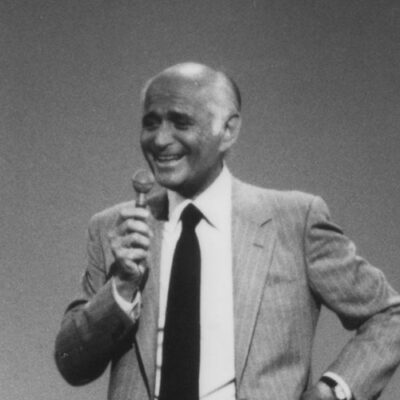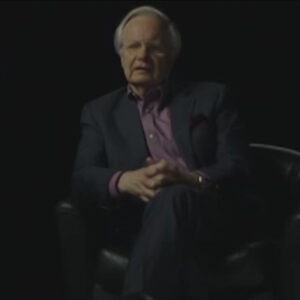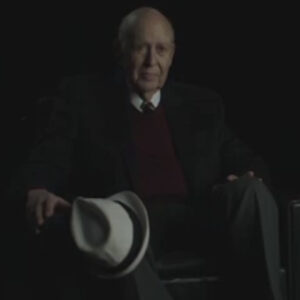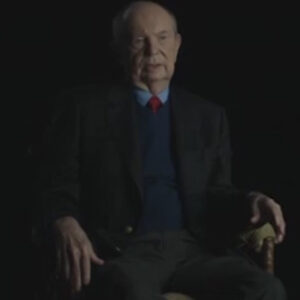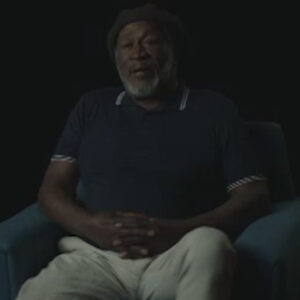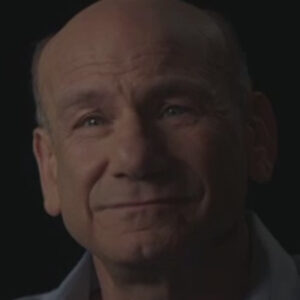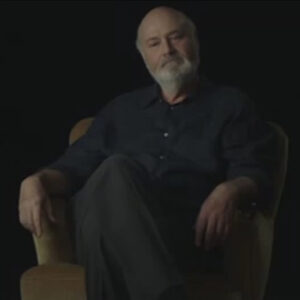Speaker So did you watch what shows of Norman did you know growing up?
Speaker Did you watch them in reruns or tell me I was 10 years old when all the family came on and the way I look at it, television can be broken into two parts B and and and before Norman and afternoon, right before Norman, you had shows from the 60s which really dealt with almost rural life in America. Petticoat Junction, The Beverly Hillbillies. They were they were entertaining and funny and not taking anything away from I Dream of Jeannie, but they weren’t dealing with real life. So it’s not just that Norman was dealing with the social issues of the day. He was starting over. He was starting from a place of real life. If you asked him, he would say, we just wanted to talk about what people were really talking about in their homes. OK, yes, it just happened to be a guy who was also a bigot, OK? But that was a specific character, a believable character that existed in Queens, New York, a very specific place with a specific attitude. OK, I think that Norman’s genius, in addition to all the social aspects of his shows, was that you would not have cared about the social messages or the points they were making if you didn’t believe the characters as people, if you didn’t relate to them as people, real people that could have been your dad, could have been your uncle, could have been the guy that lived next door, could have been you. Right. You got it because of the attention to detail in the writing of the characters. That’s really what endures because the social issues, they come and go. Some of them, unfortunately, are still with us or fortunately, they’re still with us. They’re still issues, but some of them are passé and even dated. What’s not dated is the way Archie reacts to an Edith is going on with a story and he mimes killing himself in the middle of the story. Right every time. That’s funny. Why? Because it’s relatable. It’s something that your dad may have done. By the way, if you talk to the guys who do Southpark, they’ll tell you that little Cartman is Archie Bunker. So he’s influenced that even he’s the most influential producer in the history of television. Because of this gigantic change that happened when all the family hit the air, right, it’s as if Norman not just open the door for the rest of us to come through, he kicked the door down. It was a big change to be able to talk about real life and real issues, forget how controversial they are. They’re real. That’s what that’s what’s so relevant, and it even affects a guy like me who makes Everybody Loves Raymond because I was looking for real life, can I talk about my real life and my real problems? I’m not going to tackle political issues or social issues. I don’t think I’m smart enough to do it or. Well, as well-informed as Norman Lear. But what I can get from his influence is the reality and the specificity of the relationships, the characters and the situations.
Speaker Why do you suppose if he was just talking about real life and what the rest of us were actually saying in our home? Yes. And why was it considered so dangerous to society?
Speaker Why did it provoke such a reaction if it was just reality?
Speaker It provoked a reaction because it was dealing with political and social issues. You know, there’s a reason Richard Nixon put Norman on his enemies list. It’s because he was criticizing the president of the United States. That stuff didn’t happen in sitcoms.
Speaker Amazing in this country.
Speaker Yeah, I mean, it’s yeah, it’s unbelievable, but he’s he’s an American and he’s you know, he’s not some kind of radical. He’s going by the Constitution. It’s in our Constitution that we’re allowed to have free speech. He’s exercising free speech. He’s celebrating what’s great about America by being able to have the freedom to criticize those in power. That’s what makes America great.
Speaker He’s a patriot and he put it all to the test.
Speaker He put those promises in our Constitution to the test by putting these shows on the air and by showing that sometimes there’s hypocrisy and sometimes these people who are the biggest flag wavers or the biggest bigots of all.
Speaker Absolutely. What were some of the first that you can remember that came through Norman Lear, besides having the lovable bigot on TV thinking of interracial kisses? I’m thinking of black life.
Speaker You know, when Sammy Davis Jr. was on the show, it was it could have been a very typical celebrity guest star. But because it was all in the family and because Archie is a bigot, there’s a million ways to have fun with Sammy Davis Jr.. My favorite thing, though, I mean, talk about this is this to me is genius. Yes. They cover the fact that Sammy is black. If there’s even a line. I understand the black thing he says. But what made you turn to. Great. How much further can we insult this man, he says, which a cream or sugar in your eye? That’s that’s phenomenal to me. That’s genius, and that then transcends any political or social issue to just an awkward human mistake that he said that. Right. And then, of course, when they pose for photo at the end, Sammy says, I won’t one with Archie, and he puts his arm around it. This one’s for me. And one, two, three. He turns and kisses the biggest bigot on television on the cheek, and you see the expression on his face. And it’s the ultimate comeuppance, you know, on the family had the jokes and. You know, you are laughing at these jokes, they’re having their cake and eating it, too, a little bit, you could a bigot could enjoy that trope because of those jokes. What they couldn’t enjoy was the end of every episode where the idiot got his comeuppance. All right, so laugh, laugh, laugh, and then shove that laugh down the bigots throat. That’s that’s great theater, that’s theater. He was creating theater.
Speaker And what about a Jewish kid from Hartford who’s deciding that he’s going to show America a black life in the 70s?
Speaker I mean, that’s some of that is. That takes some serious balls.
Speaker He’s got them that he’s he’s. I knowing Norman a little bit now, as I do, he doesn’t see it so much as. Different from everybody else, he’s not writing black characters, he’s writing human beings. Yes, they happen to be black and they have specific circumstances that they are living with and in. But they’re real human beings. They’re not caricatures.
Speaker Right, and he made it OK for us to watch and he made it OK for someone of a different race to try to take on these issues and he sort of like was transmitting to all the rest of us storytellers that you don’t have to be of a community to to represent that community accurately and with love and humor. I think that’s also what was transmitted sort of under the surface.
Speaker Norman is seeing the humanity in every character, no matter who they are, no matter their race or sex.
Speaker Or age. Here’s a topic that he covered brilliantly. And I don’t think I’ve ever seen it tackled in a sitcom before, since and that was rape. That episode.
Speaker Was so incredible to me because I sat there as maybe a 13 year old, 14 year old, I forget what year that episode was on and what season that was on. But I’m sitting there watching and I don’t know anything about rape. I think I know what it is. But that this guy comes.
Speaker And Edith Bunker is alone in the house and she’s the target. Suddenly. You’re thinking this is not about sex. Which most people think it is. Having never been exposed to it, you would think that’s. But this isn’t and that was the point of making Edith the target. You’re taking the most, I’m going to say one of the top three most beloved characters in the history of television, you’re making her the target of rape. The tension. That came across the television screen that you could feel from the audience that was sitting live audience watching the taping, you could hear a pin drop. It was so uncomfortable, so horrifying.
Speaker There’s a moment where. This is about to happen and you do not want to see any more you, but you wish that this would stop. There’s a moment where Edith obviously is upset and suddenly she says there’s something burning in the kitchen, it’s my it’s my roast or whatever it was, and and he lets her go to the kitchen following her. And she’s so upset. Oh, look, Smoke’s coming from the oven. She’s. Oh, my my dinner. My dinner. Get it out of here. And she she puts on her oven mitts and she takes this roast and then she flings it in the guy’s face. The cheer that went up from that studio audience in that theater watching this play was so gigantic, so loud, so emotionally honest, so big that it blew out the microphones, that you can hear it if you watch this. I hope you run this clip. If you watch this, you’ll hear it go silence because it went above a level that a microphone can hear. And then it came back because as it does. And then so it’s high fashion.
Speaker Like giant, giant. Giant. And the astonishing thing is you’re doing it at home. You’re doing it at home, there’s no way you didn’t connect with this woman and this situation and have an understanding in a visceral way, that’s why I make this illustration of. The scream from the audience, you felt it in a visceral way, unlike any other moment in the history of television. That’s how big that was to me. So now for a kid, a teenager.
Speaker Seeing a sitcom episode that dealt with a subject like rape, it defined it for me.
Speaker When does that happen?
Speaker I mean, does that still happen today? I don’t you do you?
Speaker You know, I said that that Norman kicked the door down for the rest of us to go through, some of us went through and thought that the lesson of on the family was, I can now say dirty words on television. OK, that’s a mis appropriation of the freedom. Just because you are free to say certain things doesn’t mean you should, and probably the best thing about Norman is that along with all these other things, he had taste, he had judgment. It’s not we’re not just saying this for gratuitous laughs. OK, Archie Bunker is saying these words because there’s a thought behind it.
Speaker And a point to be made. You know, anyone can say a dirty word on TV, and they do. And then movies and it’s a shot laugh.
Speaker Yeah, you were shocked to hear Archie say these things, but there was a thought behind them, there’s also something about the form.
Speaker You said it was a play. Yes, the questions I want. Yes. These were instruments of the way these were produced. What do you know about the way that these were produced and down in front of a live audience? Yes. Different about the way that this actually was put forward.
Speaker Well, you know, Desi Arnaz created this form of the three or four camera sitcom that was done before a live audience and the genius of this form. And it’s a beautiful form. It’s an art form. We were inundated not with single camera comedies, and they’re great, they look like movies and they are movies.
Speaker The three or four camera sitcom is written, rehearsed. Performed. As a play. OK, in front of a live audience, so it’s like theater. It is then captured by four different cameras. In multiple takes. And preserved. As film, so it’s this perfect in between theater and film, this. Art form that Norman Lear. Perfected.
Speaker But it’s shot live, it’s shot once, right, once through, I’m sure there’s multiple takes, there are multiple takes. But you but. An audience is there watching them all.
Speaker I want to ask about the word satire, because it’s a satirist is something that I don’t see much of today and I look at Norman’s work in that word just keeps coming. It’s comedy, but it’s also something else. I think it’s satire. Could you through it, if you please? Yeah. The difference. How do you put your finger on.
Speaker I wouldn’t I wouldn’t say that shows like All in the Family or Maude were satirical. They were more realistic. They were they were dealing in real life. They weren’t satirizing anybody. Mary Hartman was satirizing something. It was satirizing a soap opera. It was presented straight, straighter than many things are presented today, and that was very influential. You know, satire is like after Mary Hartman, you could then see Spinal Tap, a satire of the rock biography presented straight but insane. Mary Hartman presented as a soap opera, but insane. Why? We’re trying to say something about the American. Viewer that is watching these things. This is the this is the one of the great satires ever on television. So straight. That people believe that is real. The same way. The Republican committee thought that Stephen Colbert was a Republican and invited him to speak at the White House Correspondents Dinner as one of their own in front of George Bush. That Stephen Colbert does not exist without Mary Hartman.
Speaker That was amazing.
Speaker You just did that. How do you do that? That’s amazing. Yes, it’s totally true. I mean, that’s really helpful to me because, I mean, I even we interviewed Lewis last year about it. I’m obsessed with the show. Yeah. It’s so avant garde. Yes. For yeah.
Speaker I mean, I like to think that the office exists without I wish that Mary Hartman was more readily available today because I think it would I think it would play.
Speaker I think so too. I think hipsters would love it. You know, I really do. Yeah. It’s five thirty right now. Oh boy. OK, no, that’s OK. You gave me. Amazing.
Speaker What else do I want to say? I want to say one thing. What you want to say.
Speaker You do it. Go. Guys, let’s get a few more things to say. Quiet, please go ready?
Speaker Listen, I was lucky enough to get a sitcom, right, and they liked my pilot enough at CBS to let it go to series, and I came into the room with the big wigs at CBS and I see all the pictures of the famous shows on the wall. And it’s intimidating her kid like me to come in there having written one script of a pilot that now they’re telling me it’s going to go to series and they say, what do you think the series will be like? And I just remember looking at the wall at Archie and Edith and I go, I hope it’ll be something like that. And it wasn’t that I was saying, I hope it has the social impact of all the family, I couldn’t in a million years begin to dream of anything like that, nor was I capable of doing it. All I wanted was for the relationships to be as good and the characters to be as good and the actors to be as good and the stories to be as relatable. To human beings, as that show that sitting in that room at that moment, I was 10 years old, looking at my favorite show.
Speaker I think they would have bought it from you anyway. You’re pretty good, fetch me.
Speaker You’re very nice, but I so, yeah, I mean, he was the influence of your he’s not only so he’s the influence right now.
Speaker So I’m doing I’m going along and I’m making my little show. And about halfway through the first season and by the way, I tell the story to anyone in the press who’s asking me, where did your show come from in my first season? So I’m saying all these things. And I mentioned Norm and of course, as you know, the greatest. And my phone rings and they tell me Norman Lear is on line one. What?
Speaker I give the phone to the loan and he goes, I hear we’re fans of each other like what he want and it’s Norm and he goes, we should have lunch. I said, OK, and I go to lunch with him and he goes, oh, by the way, I brought you another friend of mine. He likes you, too.
Speaker He wanted to meet you. It’s Carl Reiner. And so I dropped that. And we’ve been friends ever since. That was 15 years ago. What do you find inspiration as a person now, as a man, now that you know him? What did you learn? First of all, I don’t know if you noticed he’s really old.
Speaker How do you do that?
Speaker Just that, right, just living that long, OK, that’s one thing. Here’s the amazing part. He’s smarter and younger than anyone I know.
Speaker He’s the youngest guy I know.
Speaker You might have just given me my opening line of the film. Thank you for that. No, he’s always the youngest guy in the room, it’s true, it’s true. I don’t know how he does that. What do you think about this? Do you know about this, about his comeback, sort of his new. These new shows he’s coming out with, is that like what do I use? How do you feel about that? Is there.
Speaker What took so long? Right, what took so long? The business. Has changed in ways that aren’t always fantastic, right?
Speaker Yes, we have many, many choices. We have many places. They tell me, oh, you can go pitch anywhere to so many places to pitch your show. Yeah, I go in there and I find that it’s like going to just different branches of the same company. Why? Because they all want the same audience, 14 year old boys. We’re trying to get younger. How are we younger? No one has a great idea for show, he’s had it for a long time sitting in a nursing home called Guess Who Died?
Speaker So good, right, I’d watch it.
Speaker Am I old, I guess I’m old, but I feel like my kids would watch it too if it was funny. The executives haven’t learned that much Santorum Thomas time, no, in many ways we’ve taken steps backward about that. We’ve taken steps backward because there are things that were said on all the family. That were on purpose, politically incorrect. That was the point is that he was saying these are not politically correct things to say.
Speaker But it doesn’t matter anymore, just the fact that you’re saying them doesn’t matter the context, they say you can’t say them.
Speaker Curb Your Enthusiasm was on HBO at a late hour that would never be on network TV in prime time, like I’m trying to think of the closest person who says the most awful things, right, wasn’t it? It’s like, who is out there? Would what would be the comparison?
Speaker South Park is doing it. Those guys are brilliant. They’re the they are a worthy legacy to Norman, but it is a cartoon. It’s a crudely made cartoon. It’s crude in every way. What way? Cruder than Norman ever would dream of going. But they are the grandchildren of Norman Lear. That’s that’s where it is right now.
Speaker But there is no Southpark without Norman. It’s so true, right? Absolutely. But again, he wasn’t doing it to shock you. And today, it’s more you would say it’s more callous in that respect or for shock value, the first line of certain sitcom had had the word for female genitalia in the opening line.
Speaker And because you technically can say that word on TV. They say it every other line, right? What are we doing? What’s the point? Cheap titillation is not what Norman Lear was after. That wasn’t the point of his shows. And that seems to be. A very superficial. Wrong-headed legacy.
Speaker I mean, you look at the Mod abortion episode, you look at what he did with that, I mean, yeah, there’s once in a while, a once in a while, there’s an abortion storyline, but it always gets headlines.
Speaker You know, where you 15 you know where you see the abortion story on reality TV.
Speaker That’s where you see. Right. You don’t see it really dealt with on sitcom’s.
Speaker Remember, he was dealing in the art of the sitcom. All these issues that are the stuff of drama. He was putting in a sitcom and finding laughs even.
Speaker Yeah, what does he say? Something also about the era of the 70s versus now. We just got more conservative as a society. Was that something they could have only happened then? I know you’re not a historian, but I wonder.
Speaker The world was changing.
Speaker Then and you almost couldn’t keep up, and so this stuff got in there, you know, yeah, as the door was being blown open, a lot of stuff came in. That’s right. And then it took a while for America to go. Well, we’ll keep this don’t that we can’t have. This is OK. But Norman was kicking that door down and brought a lot of the stuff in with him, right. Some of it has been bastardized, but a lot of it was for the good and still it’s.
Speaker It’s all about celebrating the freedom of our country when you think about it. Freedom of speech.
Speaker You’re awesome. This is great. No, really, thank you. I am really just trying so many things together. I’m glad you started.
Speaker I’m I’m a student on the form in general, but Norman in particular because he did the best. You’ve seen everything he’s done pretty much I can’t say I love everyone equally. You know, I can’t say that one day at a time is the equal of all in the family. And if I had to pick one, I’m picking on the family. Why? Because for a 10 year old learning about life, that’s it.
Speaker That’s it. This is the show that my parents would watch with me and let me watch.
Speaker You know what’s amazing about what you’re telling me, right? Yes. Russell Simmons sat there in that chair. I don’t know. Maybe we were in New York. I don’t remember anymore. And it was there. And he basically is telling. You’re telling me the same story he’s telling me. Except he was talking about The Jeffersons.
Speaker Sure. He’s like I learned how my dad learned how to walk. My dad walk like George Jefferson. Really all his imagination was unleashed by having a family on TV. Yes. Where the black guy was ordering everybody around. Yeah. And making fun of the white neighbors even thought about like. It’s so interesting because. And he said funny things like good times, those for white people, Jeffersons for black people, you know, like we needed George Jefferson. So it’s it’s there’s a visceral reaction to some of these shows. And they’re not all there are not all created equal. But I I’m seeing a parallel here to what common and Trey and Russell Simmons and this amazing set of African-American like leaders and entertainers, they go they talk with the same passion. You’re talking about those shows, Good Times and Jeffersons.
Speaker So I’m learning about black people from those shows. They’re relating to those shows. I’m learning about them on those shows. I’m living in a neighborhood where I don’t see that many black people, but they come in my house every week.
Speaker Right. And I love them. And I love them. What’s wrong with that, right? Isn’t that great? Yeah.
Speaker I mean, it’s like and he was the first guy to do that, so it’s really it’s very heartening because I’m getting I’m getting like different shards of this window, which is different this different little strands of the story that add up to people being inspired for their lives. That was power. That was real. That worked. Yeah. You know, Jon Stewart, we he we have a little scene of Norman and him. He said, thank you for raising me.
Speaker That’s it. That we weren’t getting the stuff in school, certainly right? So, Norman, he’s telling it like it is, that’s where that phrase belonged, telling it like it is.
Speaker That’s all he was trying to do.

